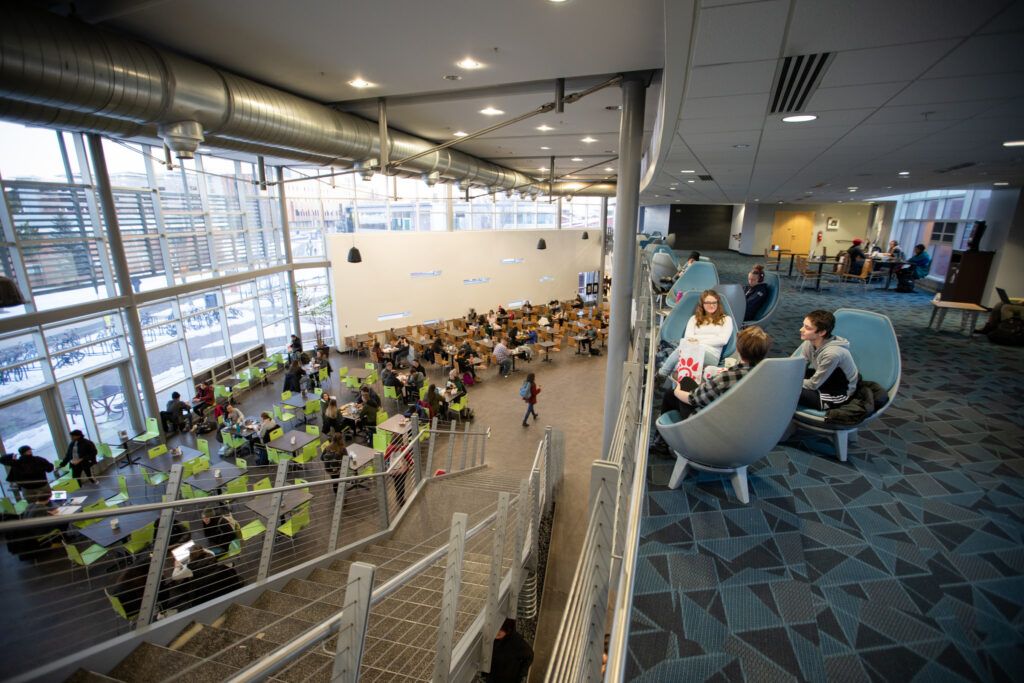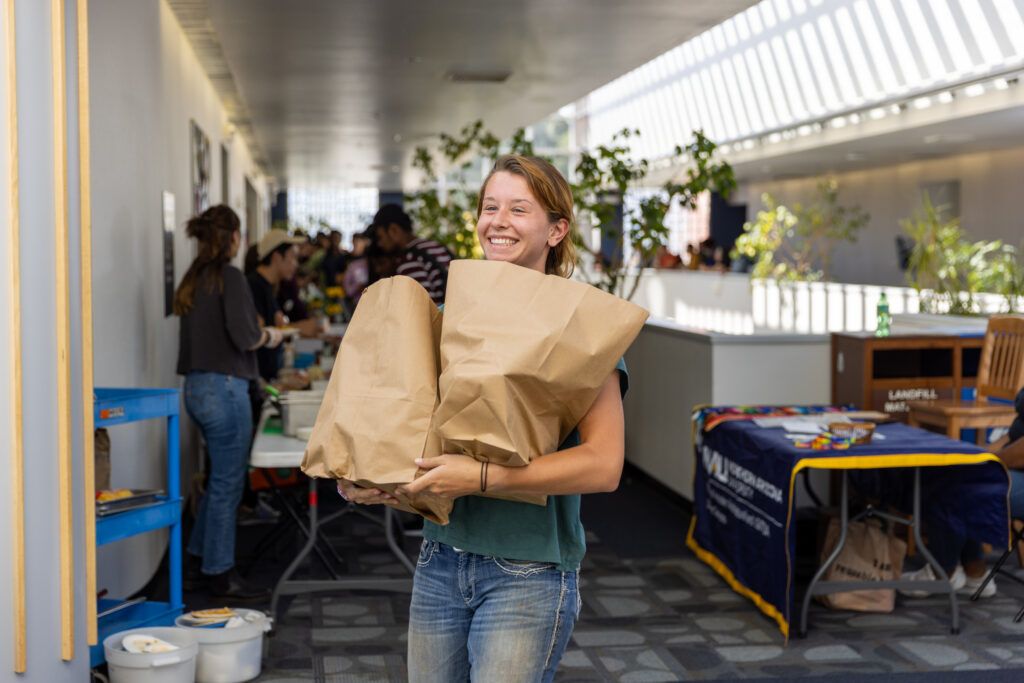Campus sustainability programs
NAU Campus Dining is building a greener future through composting, reusable containers, local ingredients, and sustainable dining practices that reduce waste and support our community.
Our journey toward sustainable dining
NAU Campus Dining began its sustainability journey with one small change: removing trays from dining halls. Today, that single step has grown into a campus-wide commitment to reducing waste and protecting the planet.
Our current efforts include:
- Full composting system in both resident dining halls
- A reusable container program at most retail locations
- Campus-wide commitment to going strawless since fall 2018
We work closely with student-led and campus organizations like the Environmental Caucus, GreenJacks, Green NAU, and the Office of Sustainability to build a more sustainable NAU.

The dirt on waste: surprising facts
- Aluminum recycling saves 90% of the energy compared to new production, and it can be recycled endlessly without losing quality.
- Composting prevents methane emissions and improves soil health.
- The Cinder Lake Landfill, projected to close in 2054, could stay open longer if we increase waste diversion.
- Food waste alone accounts for 8-10% of global greenhouse gas emissions.
- NAU’s waste reduction efforts directly support our Climate Action Plan by fostering a culture of sustainability and responsible greenhouse gas accounting.
Minimizing food waste
Feeding 30,000+ students creates a lot of potential for food waste—but we’re tackling it head-on through innovative programs:
- Leanpath helps chefs reduce food waste by tracking what gets thrown out reducing overproduction.
- Food Recovery Network collects 4,000+ pounds of leftover food each semester for local food banks.
- Composting across campus turns 300,000 pounds of food waste into nutrient-rich soil annually.
- Louie’s Leftovers sends alerts about extra food at campus events, reducing waste and fighting food insecurity.

Responsible sourcing
We believe in knowing where your food comes from. That’s why we prioritize locally sourced, organic, whole foods whenever possible.
- Local produce from Arizona farms via Sterns
- Open Air Market brings seasonal organic produce and fair-trade goods to campus
- Partnerships with local businesses including Village Baker, Tortilla Lady, and RisingHy
- Sustainable seafood from MSC-certified sources
- Cage-free eggs in all dining operations
- Fair-trade coffee & tea at select campus cafés- PETA2 A+ plant-based dining rating
Reducing our eco-footprint
We're cutting down on single-use waste in big ways:
- USEFULL reusable containers help replace disposables campus-wide
- Strawless since 2018, cutting straw use by 87% in the first semester alone
- Catering with intention: Reusable dishware is standard at catered events and for boxed lunches
Sustainability FAQs
Leanpath
What is Leanpath?
Leanpath is a tracking system that helps chefs reduce food waste in our dining halls. By recording and analyzing discarded items, we’ve cut pre-consumer waste by more than 20% since 2012.
Composting
Where does compost go?
Food scraps from The DüB and Hot Spot are turned into soil with composting machines, then used in campus gardens and landscaping.
How does composting help the environment?
Composting 300,000 pounds annually reduces emissions by 312 metric tons of CO₂ annually, and keeps waste out of landfills.
Does composting require a lot of energy?
Nope! Our systems are water-recycling and energy-efficient.
When did NAU start composting?
Composting began in 2012 with student-powered bike pickups. Machines were added by 2015.
Louie’s Leftovers
What is Louie’s Leftovers?
This program alerts students about leftover food at catered events. Just check the NAUgo app, it’s first-come, first-served and must be eaten at the event.
How do I sign up for notifications?
Download the NAUgo app and turn on Louie’s Leftovers notifications.
Local sourcing
What qualifies as “local” for Campus Dining?
Anything grown or made in Arizona.
Which farms do we source from?
We source from Abby Lee Farms, Duncan Family Farms, Patagonia Orchards, and more.
Do we source from Flagstaff businesses?
Yes! Village Baker, Tortilla Lady, and RisingHy are key local partners.
Open Air Market
What is Open Air Market?
A seasonal on-campus farmers market held on the Union Pedway with local and fair-trade items. Purchases can be made using Dining Dollars, JDE, or credit/debit cards.
How can I get involved?
Contact Jacob Vanetsky to volunteer or apply as a vendor.
Sustainable seafood
Where does our seafood come from?
All seafood on campus is sourced from MSC-certified sustainable fisheries ensuring responsible practices and quality products.
Make a Difference
Every action counts. Whether you bring your reusable container, choose a plant-based meal, or compost your scraps, you’re helping make NAU a more sustainable place to live and learn.
Let’s keep it going. Together, we can make sustainable living second nature.
